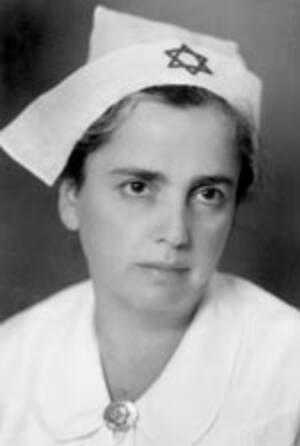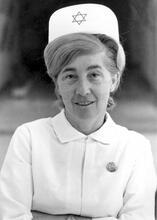Shulamith Cantor
Born Frieda Jedid Halevi, Cantor studied nursing at the American University in Beirut before making aliyah in 1919. Her knowledge of nursing and Hebrew allowed her to teach at the American Zionist Medical Unit’s nursing school. Although she quit in 1921 when she married Louis Cantor, she returned to the profession after her husband died in 1933, leaving her the sole supporter of their four children. She studied for a year at Columbia University in New York, then returned to Jerusalem to become head nurse and director of the school of nursing at Hadassah Hospital in 1934. She updated the curriculum and created specialized courses for midwives and operating room nurses, and beyond Hadassah offered advice and expertise to new nursing schools and to Israel’s new Ministry of Health.
Shulamith Cantor not only directed the Hadassah School of Nursing in Jerusalem (later the Henrietta Szold Hadassah-Hebrew University School of Nursing), but she was a leader and founder of the nursing profession in Palestine during the Mandate for Palestine given to Great Britain by the League of Nations in April 1920 to administer Palestine and establish a national home for the Jewish people. It was terminated with the establishment of the State of Israel on May 14, 1948.British Mandate Period (1920–1948) and the first years of statehood.
Early Life in Beirut and Early Career in Jerusalem
Cantor was born Frieda Jedid Halevi in Beirut, then part of Syria, in 1894. Her grandfather was the Hakham Bashi of Beirut and her father was also a public figure. She studied at the nursing school of the American University in Beirut, graduating with honors. Deciding to immigrate to Palestine, she encountered parental opposition, but since she had an uncle in Tel Aviv, they finally agreed to send her on a visit to him at the beginning of 1919. Cantor made the trip as a stowaway, arriving in Jaffa for a visit that eventually became permanent.
A few months earlier, the American Zionist Medical Unit (AZMU) had arrived and opened a nursing school where the language of instruction was Hebrew. Here Cantor, who knew some Hebrew, was accepted as a teacher.
In 1921, Cantor left the profession after her marriage to Louis Cantor, a sanitation engineer and member of the AZMU delegation, who worked to eradicate malaria and was appointed to manage the department of sanitation of the British administration’s health department. Cantor had social connections with the cream of Jerusalem society, such as the families of Judah Leon Magnes (1877–1948) and Eliezer Ben-Yehuda (1858–1922), members of the American Colony and British administration officials. She was active in the Histadrut Nashim Ivriot (Hebrew Women's Organization). In 1933, when Cantor already had four children, her husband died suddenly.
Reforming the Hadassah School of Nursing as Director
In October 1934, after a year of study at Columbia University in New York, Cantor was appointed director of the school of nursing and head nurse at Hadassah Hospital in Jerusalem. In 1939 she handed over to Bertha Landesman the task of supervising nursing services, herself focusing on running the nursing school.
Cantor wanted the nursing school’s management to be run independently, but Dr. Haim Yassky (1896–1948), the director of Hadassah from 1928 to 1948, was staunchly opposed to this. Hadassah’s leadership in New York believed that Cantor would succeed in carrying out their goals, but feared that acceding to her suggestions to broaden the theoretical component of the curriculum and even incorporate the nursing school into the Hebrew University would impact negatively on the nurses’ practical capabilities.
It was in this context that Cantor instituted educational reforms in the nursing school, updating the curriculum according to the suggestions of the International Council of Nurses (ICN) and also renewed specialized courses such as those for midwives and operating room nurses, in response to the requirements of the national public health service. During the 1930s, Cantor made efforts to organize a Jewish-Arab association of registered nurses in Palestine, in order to become a member of the ICN.
Developing Nursing in Palestine Beyond Hadassah
Beginning in 1936, Cantor counseled people involved in the development of other nursing schools in Israel. Her leadership reflected the effort to create cooperation between the schools, as well as between them and the British authorities at a time when the authority of the Jewish Jewish community in Palestine prior to the establishment of the State of Israel. "Old Yishuv" refers to the Jewish community prior to 1882; "New Yishuv" to that following 1882.Yishuv’s institutions was becoming stronger and the Jewish-Arab conflict escalating.
At the end of the 1940s, Cantor furthered the training of women soldiers demobilized from the British army, immigrant nurses, and women from Displaced Persons camps in Europe. She headed a school which under her influence became a model for new schools, thus playing a major role in determining the character of nursing in Palestine. Under the influence of leaders in American nursing such as Professor Isabel Maitland Stewart (1878–1963) of Columbia University, the school provided wide-ranging training for nurses in line with professionalist approaches in education.
Cantor had to cope with the dilemma that arose as a result of the urgent need for nurses created by the war and the waves of immigration which on the one hand, necessitated the integration of practical nurses into care-giving settings, but on the other hand led her to oppose the entry of inappropriate personnel into the profession, for fear of negatively impacting on its status.
In July 1948 Cantor was asked to establish the nursing unit at the Ministry of Health. She left the ministry in 1955. For a time she directed the course in occupational therapy and other courses at Hadassah, and then served as an adviser at both the WIZO child-care center and Ezrat Nashim Hospital in Jerusalem.
Cantor was assertive and enterprising in nursing management and education. She had a clear conception of nursing as a profession and worked determinedly towards its adoption in the society taking shape in Palestine.
Cantor died in December 1979.
Selected Works
“A Nursing School in Palestine.” The American Journal of Nursing 40:8 (1940): 880–884.
“Nursing and Nursing Education, As Done by Hadassah.” The Trained Nurse and Hospital Review (1947): 46–50.
“Nursing in Israel.” The American Journal of Nursing 51:3 (1951): 161–163.
Memoirs. Unpublished manuscript, 1968 (mimeographed).
American Jewish Historical Society Repository, New York. Records of the Hadassah Medical Organization (record group 2).
Bartal, Nira. “Theoretical and Practical Training of Jewish Nurses in Mandatory Palestine, 1918–1948, through the Prism of the Hadassah School of Nursing, Jerusalem” (Hebrew). Ph. D. diss., Hebrew University, Jerusalem, 2000.
Central Zionist Archives, Jerusalem. Records of the Hadassah School of Nursing (J117), records of the Hadassah Medical Organization (J113), and Rose Jacob’s records (A375/235).
“Shulamit Cantor, Nursing Pioneer, Feted at 80.” Jerusalem Post, March 8, 1974.
Steiner-Freud, Judith. Interview with author. Jerusalem: 1999.




